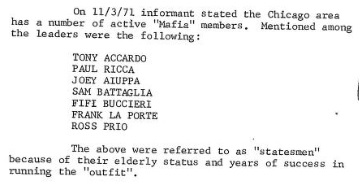PolackTony wrote: ↑Tue Sep 06, 2022 4:08 pm
Snakes wrote: ↑Tue Sep 06, 2022 3:21 pm
B. wrote: ↑Tue Sep 06, 2022 3:13 pm
Coloboy -- I agree Accardo and Ricca had more defacto power than the other consiglio members, including the boss in many ways, but in terms of formal rank they sat as firsts among equals on the consiglio. You can find underbosses, consigliere, and captains who were more powerful than the boss, but in this case it's like Kansas City or San Jose where certain elders had the most authority behind the scenes. The consiglio seems to be designed for that.
Snakes -- what I notice about the list you posted is it's very similar to the people DeRose named, with a couple of different names. It still totals 7 which adds to the idea that 7 guys sat on their council.
It was 1971, so Battaglia was in prison. Cerone (if he had a seat) was also in prison, so I'd imagine that there were a few empty spots. Also, like Tony said, 5 of the 7 guys would be dead within the next two years. Around that time (1973), it was said that Accardo was not looking to promote anyone and there were a lot of vacant spots. Obviously later on, things were shaken out (1975 at the latest), but I'm curious to wonder if the consiglio faded out because of that big turnover in 1972/73.
Just to note again, one 1974 CI referred to Chicago still having a "Board of Directors", naming Accardo, DiBella, and unnamed other senior members. And then the Bompensiero info from Pilotto that same year seems to at least strongly suggest that the new gen capos Pilotto, Torello, and Lombardo were serving with Accardo in that capacity. With DiBella, that would make 5. With Cerone and Aiuppa, 7.
I'm really out of my element here but given the similarities we see between Chicago and Detroit I thought I should point something out in Detroit.
On the Detroit seggiu/consigliu/pannel sat the B, U and C but also Bill Tocco and Peter Licavoli. Bill's organization background is up for debate but Peter Licavoli was ID'd as a captain who sat on the panel but resided in Arizona and the individual running his decina was Mike Rubano. We don't have an insider like DiLeonardo or Pennisi or Calabrese to say whether Licavoli vacated his capo position and just sat on the panel or if he kept it and Michael Rubino was acting captain. These is organizational inside info that's lost to history. But flipping to the operational side of things, regardless of what ranks Licavoli and Bill Tocco held outside of the seggiu, their underlings/successors in Rubino and Jack Tocco would most certainly have listened to them to the point where it'd be safe to say: "Yeah, he's boss of the crew but all important decisions are made by Licavoli."
I think the 1960's were an interesting time in the American Mafia, bosses of various families around since the 1920's were entering their twilight years and wanted to slow down but didn't want to relinquish full control. Having a seat on these panels might have been the best option to hold an administrative stake without the heavy administrative/political burdens of the office positions.
Charting out these councils on an organizational chart showing its influence is incredibly hard to do in uniform because some councils held incredible influence over the boss while others appear as more advisory boards. In terms of Detroit and Chicago, Zerilli had been boss for decades while Giancana was relatively new, if things were reversed and Tony Z the son was boss and Ricca still boss, one would argue that the council controls Zerilli but that Ricca precedes on or over a council. Additionally, the Licavoli-Rubino relationship might explain certain Chicago discrepancies regarding capo/crew bosses within their decine.



